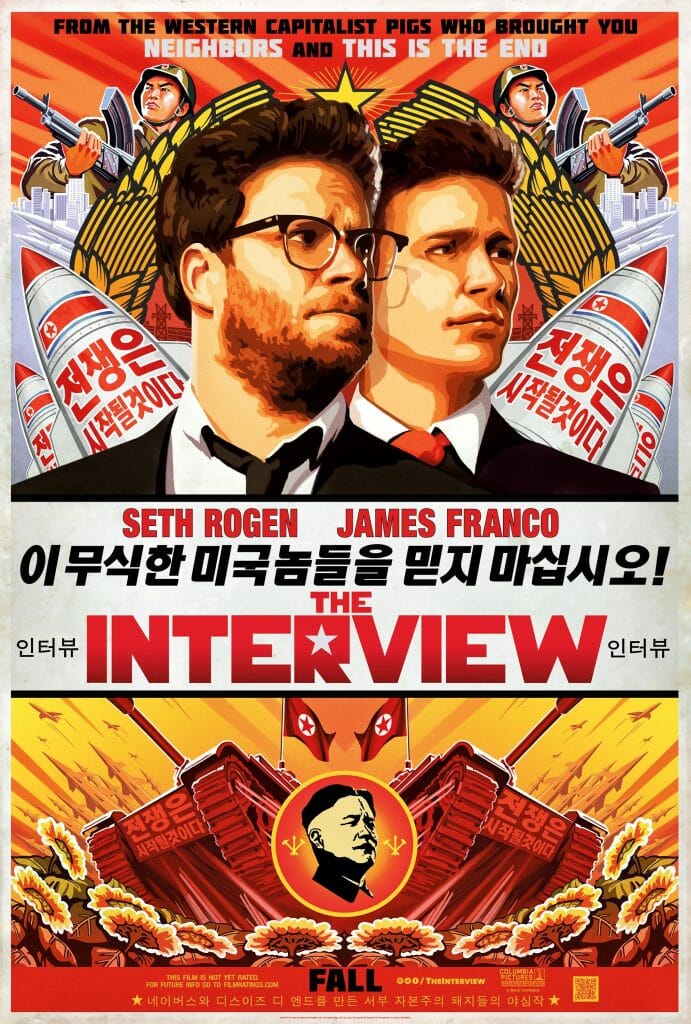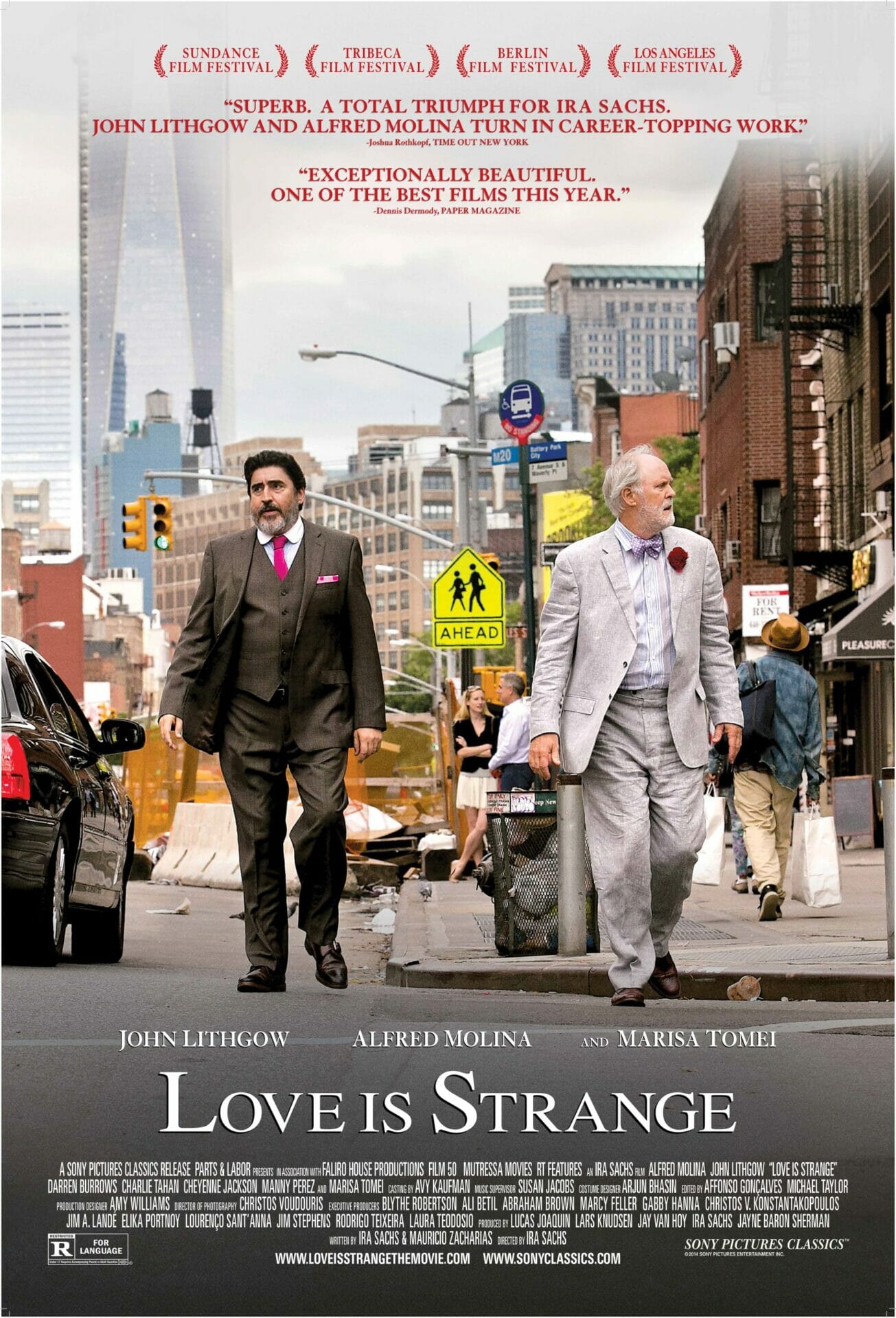Starting out as Cohn-Brandt-Cohn Film Sales in 1918, the studio adopted the name Columbia Pictures in 1924. Thanks to its association with Frank Capra in the 1920s, the studio gradually rose in prominence and over the subsequent decades became home to stars such as Cary Grant, Rosalind Russell, and Rita Hayworth. Following a brief period of ownership by The Coca-Cola Company and the spinning off of Tri-Star Pictures (which it subsequently merged with), Columbia Pictures was acquired by Sony in 1989, and is now a subsidiary of Sony Pictures Entertainment.
By and large, Sony Columbia has never had the most impressive track record when it comes to LGBT-inclusive films. The 1962 political thriller Advise and Consent did contain a subplot about a Senate chairman who is blackmailed over a past affair with a man (and subsequently commits suicide), but it’s hardly held up as a high point in the LGBT cinematic canon. The same can be said for 1992’s Basic Instinct from Tri-Star Pictures, which was decried by LGBT groups for its defamatory portrayal of lesbian and bisexual women. On a more positive note, Tri-Star Pictures also released popular inclusive films like Philadelphia (1993), Threesome (1994), and As Good as it Gets (1997). In more recent years, parent company Sony Pictures has released Rent (2005), The Girl With the Dragon Tattoo (2011), and The Mortal Instruments: City of Bones (2013).
In 2014, Sony Columbia released 18 films, of which 1 included appearances by LGBT people, amounting to 6%. This film did not pass the Vito Russo Test.
THE INTERVIEW
Widest theatrical release: 581 theaters
Due to the devastating cyber-attacks on Sony it allegedly inspired, The Interview was easily one of the most headline-grabbing films of the year, though this also resulted in a more limited theatrical run than the studio originally intended. With all the political discussions swirling around its release, less attention was paid to the film's opening minutes in which rapper Eminem, playing a version of himself, comes out as gay during an interview. The big joke of course is that Eminem is famous for his anti-gay lyrics, so his matter-of-factly stating that he's "homosexual" is a big deal for the fictional tabloid reporter played by James Franco, to whom Eminem says, "When I say things about gay people, or people think my lyrics are homophobic– it's because I'm gay." The scene met skepticism from many LGBT viewers who saw it more as trolling for buzz than a clever joke about Eminem's persona, and we're inclined to agree.
22 JUMP STREET
Widest theatrical release: 3426 theaters
The first Jump Street film actually featured a black, gay teen character in a minor role meant to humorously symbolize how progressive today's young people are, but 22 Jump Street's LGBT-themed humor is significantly more complicated. There are numerous jokes about partners Schmidt and Jenko being mistaken for a gay couple, including one scene in which they engage in couples counseling with a therapist to hide the fact that they were snooping but end up discussing their actual (non-romantic) relationship problems. Another joke sees Jenko becoming more enlightened after taking a human sexuality class and angrily confronting some mobsters for taunting them with homophobic slurs. More problematic was their prison visit to the previous film's villain, Mr. Walters, who they had previously shot in the genitals. Most of the scene's jokes revolve around Walter's bragging that he now has a vagina and is happily the "bitch" of fellow inmate Eric, who was also arrested in the first film. In this film, Walters is not so much a character with a discernable sexual orientation or gender identity as he represents a series of jokes about prison rape, so GLAAD did not count him.
THE MONUMENTS MEN
Widest theatrical release: 3083 theaters
The George Clooney-directed war drama The Monuments Men was based on the real-life account of an Allied group responsible for saving culturally important art and items from the Nazis during World War II. Among those in the film's ensemble cast is a character loosely based on gay art collector and New York Ballet founder Lincoln Kirstein played by Bob Balaban. Unfortunately, these differently-named characters are not meant as direct depictions of their real-life counterparts, so we did not count "Preston Savitz" since the film never addressed his identity or personal life.

Founded in 1992, Sony Pictures Classics is the independent arm of Sony Pictures Entertainment, which acquires, produces, and distributes independent films and documentaries. Among the many inclusive films Sony Pictures Classics has released since its inception are My Life in Pink (1997) about a gender non-conforming child; The Celluloid Closet (1995), a documentary about LGBT representations in film based on the book with the same title written by Vito Russo; the Alan Ginsberg-centered story Kill Your Darlings (2013); and Pedro Almodovar's I'm So Excited! (2013).
 LOVE IS STRANGE
LOVE IS STRANGE
Widest theatrical release: 138 theaters
One of the most impactful films of 2014 to focus on a same-sex relationship was undoubtedly Ira Sachs’ Love Is Strange, which followed a gay couple forced to live apart by circumstances. The film begins with Ben and George celebrating their legal marriage following the passage of marriage equality in New York, but this unfortunately results in George losing his long time job teaching in a private Catholic school. Loving friends and relatives are eager to step in and offer places to stay, but the result is that the couple must now live apart, and as time goes on tensions rise on all sides. It actually feels like several character studies going on at once, but at its heart is the decades-old love between Ben and George, who the supporting characters profess to look up to as models of commitment. With its naturalistic, almost mundane style and narrative focus on a gay couple (and an older gay couple at that) this is the type of film that's nearly impossible to imagine coming out of a major studio. Sony Pictures Classics picked it up following its premiere at the Sundance Film Festival and gave it a targeted roll out in the summer.
FOXCATCHER
Widest theatrical release: 759 theaters
Though some have speculated that John du Pont – the real life murderer and wrestling enthusiast whose case inspired the film Foxcatcher – may have been gay, others involved in the events depicted by the film have disputed this. At any rate, the film takes no clear stance on this, so GLAAD did not count the character as an LGBT depiction, though some may perceive him as such.


 LOVE IS STRANGE
LOVE IS STRANGE










